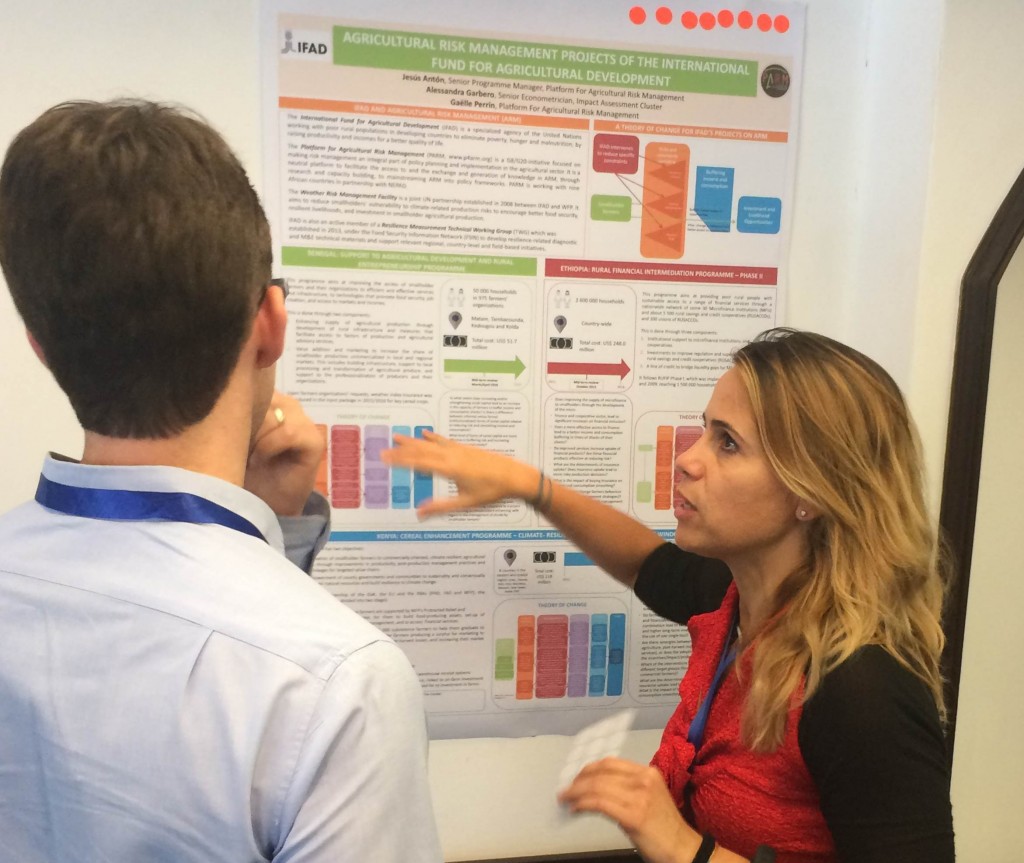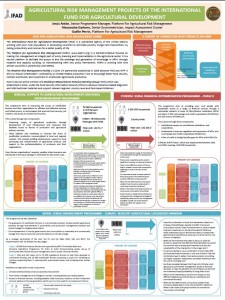
The International Initiative for Impact Evaluation (3iE) organized a matchmaking workshop on Agricultural Risk Management, in which PARM contributed through active participation in a panel discussion and in partnership with IFAD's Strategy and Knowledge Department to propose IFAD projects for evaluation.
Nairobi, 21 April 2016 – The International Initiative for Impact Evaluation (3iE) is an international grant-making NGO promoting evidence-informed development policies and programmes. As such, it promotes collaboration between different stakeholders, including international organizations and research centers, on various topics. In 2016, they are launching a evaluation window on Agricultural Risk Mitigation. It is in this context that PARM participated in a matchmaking workshop in Nairobi, Kenya on 19-20 April 2016.
The objective of their evaluation window is to increase evidence on the effectiveness of financial instruments in reducing, mitigating and transferring risks faced by smallholder farmers in developing countries. These financial instruments include (but are not restricted to) bundled products that combine non-financial risk management products and services with a financial component.
Matchmaking workshop: Assessing the impact of programmes targeted at smallholder farmers for Agricultural Risk Mitigation
The objective of the Matchmaking workshop was to discuss the draft of 3ie’s request for proposal document for the grant programme and to facilitate a match between implementing agencies and researchers.
The workshop was split between panel discussions on key issues related to impact evaluation and agricultural risk management, and presentations of projects by implementing agencies. Panel discussions included topics such as “What are the key questions for agricultural risk mitigating programmes that research can help answer?”, “Discussion on the theory of change for agricultural risk mitigation”, or “Measuring impact in Agricultural risk mitigation programmes: Challenges in design and method”.
PARM’s contribution
Panel discussion: What are we learning from the research in the area of agricultural risk?
Jesús Antón, Senior Programme Manager of PARM, was one of the panelists of the second discussion. Looking at what has been learned, but more importantly what could be learned from research in the field of agricultural risks management, he emphasized the need for a holistic approach to agricultural risk management, going beyond financial tools such as insurance used in isolation. He advocated for the use of “bundled” interventions, combining several tools to address several risks in various ways, as to have an overall positive impact on farmers’ behaviors and risk management practices.
For the purpose of impact evaluation of agricultural risk management projects, this means that looking at the uptake of a particular product or tool is not sufficient: what would benefit the risk management field is evidence of the impact of using several tools together on the smoothing of income and consumption of farmer households.
Fruitful exchanges with the other panelists and participants demonstrated a strong interest for the holistic approach and the impact evaluation of a combination of tools rather than of specific tools in isolation.
Poster presentation: IFAD projects in Agricultural Risk Management
PARM also worked in collaboration with the Strategy and Knowledge Management Department if IFAD to present projects implemented by IFAD and related to Agricultural Risk Management to researchers interested in evaluating such projects.
Alessandra Garbero, Senior Econometrician of the Impact Assessment Cluster presented a poster jointly prepared with PARM, which summarized key information on three projects implemented by IFAD in Senegal, Ethiopia and Kenya. The theories of change described for each project how IFAD’s intervention should result in changes in farmers’ behavior, and potential questions to be answered by the researchers were suggested.
The poster received a lot of attention during the workshop, and several researchers showed interest to partner to design proposals for impact evaluation of these projects.

Alessandra Garbero (Senior Econometrician, IFAD Impact Assesment Cluster) presenting the poster prepared in collaboration with the PARM team on three IFAD projects related to Agricultural Risk Management
Next steps
In partnership with the Strategy and Knowledge Department of IFAD, and interested researchers, PARM will submit proposals for the evaluation window based on one or more projects currently implemented in African countries by IFAD.
